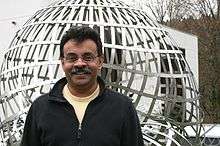Madhu Sudan
Madhu Sudan (born 12 September 1966)[1] is an Indian-American computer scientist. He has been a Gordon McKay Professor of Computer Science at the Harvard John A. Paulson School of Engineering and Applied Sciences since 2015.
Madhu Sudan | |
|---|---|
 | |
| Born | 12 September 1966 |
| Alma mater | IIT Delhi University of California, Berkeley |
| Awards | Gödel Prize (2001) Nevanlinna Prize (2002) Infosys Prize (2014) |
| Scientific career | |
| Thesis | Efficient Checking of Polynomials and Proofs and the Hardness of Approximation Problems (1992) |
| Doctoral advisor | Umesh Virkumar Vazirani |
| Doctoral students | Venkatesan Guruswami Benjamin Rossman |
Career
He received his bachelor's degree in computer science from IIT Delhi in 1987[1] and his doctoral degree in computer science at the University of California, Berkeley in 1992.[1][2] He was a research staff member at the IBM Thomas J. Watson Research Center in Yorktown Heights, New York from 1992 to 1997 and moved to MIT after that.[1] From 2009 to 2015 he was a permanent researcher at Microsoft Research New England before joining Harvard University in 2015.
Research contribution and awards
He was awarded the Rolf Nevanlinna Prize at the 24th International Congress of Mathematicians (ICM) in 2002. The prize recognizes outstanding work in the mathematical aspects of computer science. Sudan was honored for his work in advancing the theory of probabilistically checkable proofs—a way to recast a mathematical proof in computer language for additional checks on its validity—and developing error-correcting codes.[1] For the same work, he received the ACM's Distinguished Doctoral Dissertation Award in 1993 and the Gödel Prize in 2001 and was an Invited Speaker of the ICM in 1998.[3] He is a Fellow of the ACM (2008).[4] In 2012 he became a fellow of the American Mathematical Society.[5] In 2014 he won the Infosys Prize in the mathematical sciences.[6] In 2017 he was elected to the National Academy of Sciences.[7]
Sudan has made important contributions to several areas of theoretical computer science, including probabilistically checkable proofs, non-approximability of optimization problems, list decoding, and error-correcting codes.[6]
References
- "Madhu Sudan Receives Nevanlinna Prize" (PDF), Mathematics People, Notices of the American Mathematical Society, 49 (10): 1266, October 2002.
- Madhu Sudan at the Mathematics Genealogy Project
- Sudan, Madhu (1998). "Probabilistic verification of proofs". Doc. Math. (Bielefeld) Extra Vol. ICM Berlin, 1998, vol. III. pp. 461–470.
- Biography
- List of Fellows of the American Mathematical Society, retrieved 2013-08-05.
- Madhu Sudan, Infosys Prize Laureates, retrieved 2015-02-28.
- National Academy of Sciences Members and Foreign Associates Elected, National Academy of Sciences, 2 May 2017.